A vocation to married life enables us to love more deeply than we can by our own power. It transforms a contract between two people into a way of discipleship and conversion.
The USCCB tells us that Vocations must be talked about regularly if a "vocation culture" is to take root in parishes and families.
Common questions about deacons
Deacons are ministers ordained to serve the people of God through word, liturgy and charity on behalf of the bishop. The title deacon comes from the Greek word for service: diaconia. Through reception of the sacrament of holy orders by a bishop, deacons are configured to Jesus the Servant who “did not come to be served, but to serve” (Mark 10:45). Diaconal ordination “goes beyond a simple election, designation, delegation, or institution by the community, for it confers a gift of the Holy Spirit that permits the exercise of a ‘sacred power.’ The laying on of hands by the bishop, with the consecratory prayer, constitutes the visible sign of this ordination” (Catechism of the Catholic Church—CCC 1538).
The diaconate is the first rank of holy orders in the Catholic Church. Deacons are the "eyes and ears" of the bishop by providing service in his name within the community and at the parish where the deacon is assigned. Diaconal ministry complements the ministries of priests and bishops for the good of the people of God. Permanent deacons are ordained to a lifelong ministry of service.
The ministry of the deacon is service. That service is exercised in three distinct areas: word, liturgy and charity.
Word: At ordination, the deacon receives the Book of Gospels from the bishop with the charge: Receive the Gospel of Christ whose herald you now are. Believe what you read, teach what you believe, and practice what you teach. The ministry of the Word includes proclaiming, preaching and teaching the truths of sacred Scripture and the Catholic faith. These functions can be done in context with the Church, in social circles, among co-workers and within families. Deacons often prepare couples for marriage, parents for baptisms and individuals for reception into the Catholic Church.
Liturgy: The deacon’s ministry is profoundly linked with the Eucharist at Mass. The deacon brings the needs of the Christian community to the altar and then encourages the faithful to live their baptismal responsibilities in service to one another. Deacons at Mass lead the community in the penitential act (Lord have mercy), proclaim the Gospel, preach, lead the prayer of the faithful (universal prayer), accept and prepare the gifts of bread and wine at the altar, invite the community to express the sign of peace, assist in the distribution of holy Communion and dismiss the community at the end of Mass. Deacons are ordinary ministers of baptism, marriage, and funerals.
Charity: As ministers of charity, deacons live the Church’s mission to proclaim God’s mercy, love, and justice while inspiring others to do the same. Diaconal charity involves reaching out to the poor and homeless, ministering to the hospitalized and incarcerated, speaking out on behalf of those who are marginalized or whose voices are unrecognized, and advocating for the dignity of all people. Diaconal charity extends to teaching the faith, giving retreats, assisting charitable organizations and managing diocesan offices or parishes when appointed by the bishop. Given the broad experience and education that deacons bring to their ministry, the variety of charity conducted by deacons is unlimited.
Yes, deacons are clerics by virtue of ordination through reception of the sacrament of holy orders. There are three ranks of clergy in the Catholic Church: bishops, priests and deacons. Bishops and priests receive the mission and power to act in the person of Christ the Head, while deacons receive the faculty to serve the people of God in the person of Christ the Servant through the ministries of liturgy, word and charity.
Yes, unlike bishops or priests, permanent deacons may be married at the time of ordination. They are responsible for their own financial support and frequently work in secular occupations to support their families. If a deacon’s spouse dies, the deacon is expected to remain single and celibate for the remainder of his life.
Church norms specify that a man must reach his 35th birthday at the time of ordination if married. If a man wants to be a deacon and is not married, he may be ordained at age 25 with a vow to remain celibate.
God calls every person to a vocation whether as single persons, married, religious, lay or ordained. Each of these vocations is holy and can be lived in ways that are satisfying and pleasing to both God and yourself. Discerning whether you have a vocation to the diaconate is a multi-year process because it takes time to understand what God is calling you to do with your life. The discernment process involves learning about the ministry of the deacon, growth in prayer life, continued reception of the sacraments (Eucharist and penance), meeting with a spiritual advisor, demonstrating the qualities of being a deacon, informed consent by your spouse, support of your pastor and formal application to the diocese where you live.
Read and contemplate the National Directory for the Formation, Ministry and Life of Permanent Deacons in the United States, with particular focus on chapters 1 & 4.
Talk to your spouse (if applicable) and to your pastor. If there is a deacon in your parish, talk with him about being a deacon.
Questions?
Please contact Lorrie Conway, Director of Clergy Formation at 206-670-2505 or lorrie.conway@seattlearch.org
Yes. Just because you might be interested in being a deacon, there is no embarrassment if you later decide that it isn’t for you. The discernment process will have helped you grow in your relationship with God and expanded your self-understanding.
(Source: National Association of Diaconate Directors)
Learn more about the permanent diaconate:
“Cast all your anxieties on him, for he cares about you.”
~ 1 Peter 5:7
